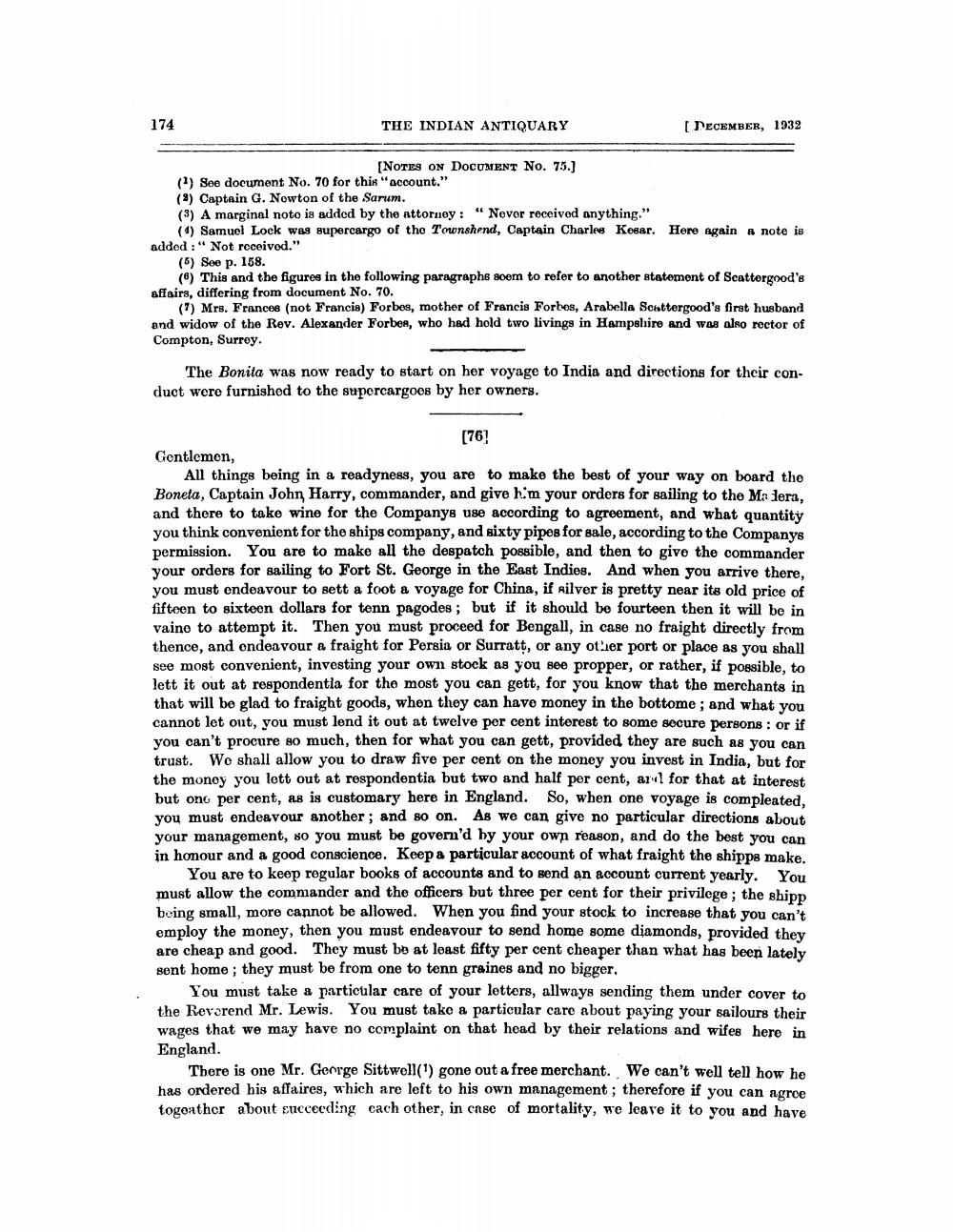________________
174
THE INDIAN ANTIQUARY
[ DECEMBER, 1932
(NOTES ON DOCUMENT No. 75.) (?) See document No. 70 for this account." (2) Captain G. Nowton of the Sarum. (3) A marginal noto is added by the attorney: “Never received anything."
(4) Samuel Lock was supercargo of the Townshend, Captain Charles Kesar. Here again a note is added :" Not received."
(5) See p. 168.
(6) This and the figures in the following paragraphe soem to refer to another statement of Scattergood's affairs, differing from document No. 70.
(7) Mrs. Frances (not Francis) Forbes, mother of Francis Forbes, Arabella Scattergood's first husband and widow of the Rev. Alexander Forbes, who had hold two livings in Hampshire and was also rector of Compton, Surroy.
The Bonita was now ready to start on her voyage to India and directions for their conduct were furnished to the supercargoos by her owners.
[76] Gentlemen,
All things being in a readyness, you are to make the best of your way on board the Boneta, Captain John Harry, commander, and give him your orders for sailing to the Madera, and there to take wine for the Companys use according to agreement, and what quantity you think convenient for the ships company, and sixty pipes for sale, according to the Companys permission. You are to make all the despatch possible, and then to give the commander your orders for sailing to Fort St. George in the East Indies. And when you arrive there. you must endeavour to sett a foot a voyage for China, if silver is pretty near its old price of fifteen to sixteen dollars for tenn pagodes; but if it should be fourteen then it will be in vaine to attempt it. Then you must proceed for Bengall, in case no fraight directly from thence, and ondeavour a fraight for Persia or Surratt, or any other port or place as you shall see most convenient, investing your own stock as you see propper, or rather, if possible, to lett it out at respondentia for the most you can gett, for you know that the merchants in that will be glad to fraight goods, when they can have money in the bottome; and what you cannot let out, you must lend it out at twelve per cent interest to some secure persons : or if you can't procure so much, then for what you can gett, provided they are such as you can trust. We shall allow you to draw five per cent on the money you invest in India, but for the money you lett out at respondentia but two and half per cent, an 1 for that at interest but ono per cent, as is customary here in England. So, when one voyage is compleated, you must endeavour another; and so on. As we can give no particular directions about your management, so you must be govern'd by your own reason, and do the best you can in honour and a good conscience. Keep a particular account of what fraight the shipps make.
You are to keep regular books of accounts and to send an account current yearly. You must allow the commander and the officers but three per cent for their privilege; the shipp being small, more cannot be allowed. When you find your stock to increase that you can't employ the money, then you must endeavour to send home some diamonds, provided they are cheap and good. They must bo at least fifty per cent cheaper than what has been lately sent home; they must be from one to tenn graines and no bigger,
You must take a particular care of your letters, allways sending them under cover to the Reverend Mr. Lewis. You must take a particular care about paying your sailours their wages that we may have no complaint on that head by their relations and wifes here in England.
There is one Mr. George Sittwell(1) gone out a free merchant. We can't well tell how he has ordered his affaires, which are left to his own management; therefore if you can agree togoather about succeeding each other, in case of mortality, we leave it to you and have




